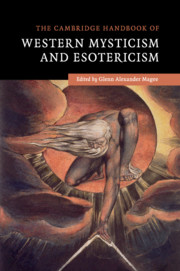Book contents
- Frontmatter
- Dedication
- Contents
- Acknowledgments
- Editor's Introduction
- List of contributors
- I ANTIQUITY
- II THE MIDDLE AGES
- III THE RENAISSANCE AND EARLY MODERNITY
- IV THE NINETEENTH CENTURY AND BEYOND
- 20 Spiritualism
- 21 H. P. Blavatsky and Theosophy
- 22 Rudolf Steiner and Anthroposophy
- 23 The Golden Dawn and the O.T.O.
- 24 G. I. Gurdjieff and the Fourth Way
- 25 C. G. Jung and Jungianism
- 26 René Guénon and Traditionalism
- 27 Via Negativa in the Twentieth Century
- 28 Contemporary Paganism
- 29 The New Age
- V COMMON THREADS
- Suggestions for Further Reading
- Index
- References
29 - The New Age
from IV - THE NINETEENTH CENTURY AND BEYOND
Published online by Cambridge University Press: 05 May 2016
- Frontmatter
- Dedication
- Contents
- Acknowledgments
- Editor's Introduction
- List of contributors
- I ANTIQUITY
- II THE MIDDLE AGES
- III THE RENAISSANCE AND EARLY MODERNITY
- IV THE NINETEENTH CENTURY AND BEYOND
- 20 Spiritualism
- 21 H. P. Blavatsky and Theosophy
- 22 Rudolf Steiner and Anthroposophy
- 23 The Golden Dawn and the O.T.O.
- 24 G. I. Gurdjieff and the Fourth Way
- 25 C. G. Jung and Jungianism
- 26 René Guénon and Traditionalism
- 27 Via Negativa in the Twentieth Century
- 28 Contemporary Paganism
- 29 The New Age
- V COMMON THREADS
- Suggestions for Further Reading
- Index
- References
Summary
Introduction: “The New Age,” A Catchall Term?
In modern society, an astounding range of religious or “spiritual” alternatives to organized religion are available. A very incomplete list includes tarot reading, Reiki healing, swimming with dolphins, astrology, (neo-)shamanism, crystal healing, psychic phenomena, the recall of past-life memories, Aura-Soma remedies, fire walking, and various modes of “positive thinking.” Among the list of the spiritual, one also finds vast numbers of books, with titles such as A Course in Miracles, Conversations with God, and The Celestine Prophecy. The term “New Age” is often affixed to them all, at least by people who do not personally share any of these interests. Insiders will, on the contrary, often insist that the label is derogatory or even meaningless. Rather than seeing their own beliefs and practices as part of any wider social movement, many hold that they have embarked on a thoroughly individual quest. Scholarly literature hovers uncertainly between the two views, some authors insisting that there is a minimal shared discourse uniting these various practices and ideas, others rejecting “New Age” as a thoroughly vacuous term. One difficulty with the expression is that, in common with many other terms employed in the study of religion, it was a designation coined by the members of a particular religious milieu and has since become employed in a wide and not always compatible variety of ways.
The concept “New Age” is diffuse also because it consists of a combination of a common adjective and an equally common noun and has therefore historically been repeatedly used in contexts that would seem to have few points of contact with the modern concept. William Blake uses the term in a publication dated 1804, in a context that has roots in the writings of the eighteenth-century visionary Emanuel Swedenborg, and earlier. Other early references are Warren Felt Evans's book The New Age and Its Messenger (1864), and the literary magazine The New Age founded in 1894.
New Age as label for a utopian vision with an occultist tinge is a later creation.
- Type
- Chapter
- Information
- The Cambridge Handbook of Western Mysticism and Esotericism , pp. 344 - 356Publisher: Cambridge University PressPrint publication year: 2016
References
- 1
- Cited by



